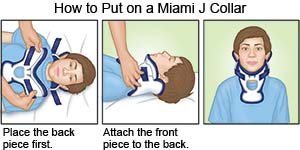Miami J Collar
Medically reviewed by Drugs.com. Last updated on Aug 4, 2025.
A Miami J collar is used to prevent head and neck movement after a spinal cord injury or surgery.
DISCHARGE INSTRUCTIONS:
Return to the emergency department if:
- You have severe pain.
- You cannot move your arm, hand, leg, or foot.
Contact your healthcare provider if:
- The collar is too tight or too loose.
- You have back pain.
- You have neck pain or a headache.
- You have a red, painful, or open area of skin under the collar.
- Your hand or foot is numb, tingles, or is weak.
- You have questions or concerns about when to use your collar.
Related medications
How to put the collar on:
It is important to put the collar on correctly so your spine is lined up properly. Ask for help if you cannot put your collar on by yourself.
- Place the pads against the plastic. Each pad is made to fit into one part of the collar.
- Lie on your back with both pieces of the collar within easy reach.
- Slide the shorter part of the collar against the back of your neck and into position.
- Place the front of the collar against your chest wall. Hold it against your neck. Your chin should rest snugly and be centered in the chin rest. The sides of the front piece of the collar should be pointed up toward your ears. The sides of the back piece will overlap the sides of the front.
- Use the straps to attach the pieces. The straps should be tight enough to prevent your neck from turning from side to side. You can adjust the length of the collar with a small dial at the back or side of the collar.
- Make sure that no plastic is touching your skin.
 |
Self-care:
- Check your skin every day. Have someone else check your skin if you are not able to see it well. Tell your healthcare provider if your skin looks red or has blisters.
- Shower with the collar on. After your shower, lie down to remove the collar. Have someone clean your neck and chin with warm water and soap. Rinse the soap and dry your skin. Do not put powders or lotions on your skin unless your healthcare provider says it is okay. Replace the collar and secure the straps.
- Keep a bandage over your incision as directed. A bandage may prevent pressure or irritation from the collar. It may also catch drainage from your incision and prevent the collar from getting wet. Ask your healthcare provider what bandages are okay to place over your incision.
- Wash the collar pads as directed. Wash the collar pads when they get wet or dirty. Wash the pads with mild facial soap and water. Do not use bleach or detergents. Squeeze the water out of the pads and lay them flat to dry. Make sure the pads are dry before you place them back in the collar.
- Do not move your neck when your collar is off. Always lie flat without a pillow if the collar needs to be opened. You or someone else should check your collar before you get out of bed. Do not allow anyone to adjust the collar unless they are trained to do it. Hold your neck straight when your collar is off. Ask someone to help you hold your neck straight if you need it. Movement of your neck may cause injury or pain.
Follow up with your doctor as directed:
Write down your questions so you remember to ask them during your visits.
© Copyright Merative 2025 Information is for End User's use only and may not be sold, redistributed or otherwise used for commercial purposes.
The above information is an educational aid only. It is not intended as medical advice for individual conditions or treatments. Talk to your doctor, nurse or pharmacist before following any medical regimen to see if it is safe and effective for you.
Learn more about Miami J Collar
Care guides
Further information
Always consult your healthcare provider to ensure the information displayed on this page applies to your personal circumstances.
